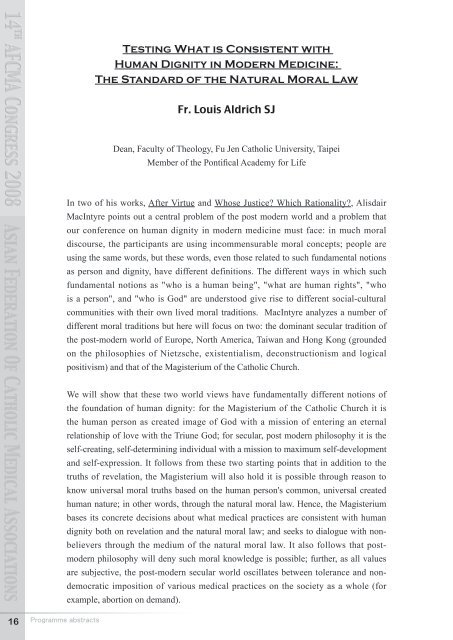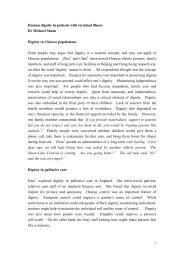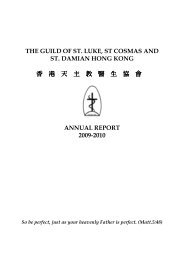program book
program book
program book
- No tags were found...
Create successful ePaper yourself
Turn your PDF publications into a flip-book with our unique Google optimized e-Paper software.
14 th AFCMA Congress 2008 Asian Federation Of Catholic Medical AssociationsTesting What is Consistent withHuman Dignity in Modern Medicine:The Standard of the Natural Moral LawFr. Louis Aldrich SJDean, Faculty of Theology, Fu Jen Catholic University, TaipeiMember of the Pontifical Academy for LifeIn two of his works, After Virtue and Whose Justice? Which Rationality?, AlisdairMacIntyre points out a central problem of the post modern world and a problem thatour conference on human dignity in modern medicine must face: in much moraldiscourse, the participants are using incommensurable moral concepts; people areusing the same words, but these words, even those related to such fundamental notionsas person and dignity, have different definitions. The different ways in which suchfundamental notions as "who is a human being", "what are human rights", "whois a person", and "who is God" are understood give rise to different social-culturalcommunities with their own lived moral traditions. MacIntyre analyzes a number ofdifferent moral traditions but here will focus on two: the dominant secular tradition ofthe post-modern world of Europe, North America, Taiwan and Hong Kong (groundedon the philosophies of Nietzsche, existentialism, deconstructionism and logicalpositivism) and that of the Magisterium of the Catholic Church.We will show that these two world views have fundamentally different notions ofthe foundation of human dignity: for the Magisterium of the Catholic Church it isthe human person as created image of God with a mission of entering an eternalrelationship of love with the Triune God; for secular, post modern philosophy it is theself-creating, self-determining individual with a mission to maximum self-developmentand self-expression. It follows from these two starting points that in addition to thetruths of revelation, the Magisterium will also hold it is possible through reason toknow universal moral truths based on the human person's common, universal createdhuman nature; in other words, through the natural moral law. Hence, the Magisteriumbases its concrete decisions about what medical practices are consistent with humandignity both on revelation and the natural moral law; and seeks to dialogue with nonbelieversthrough the medium of the natural moral law. It also follows that postmodernphilosophy will deny such moral knowledge is possible; further, as all valuesare subjective, the post-modern secular world oscillates between tolerance and nondemocraticimposition of various medical practices on the society as a whole (forexample, abortion on demand).16 Programme abstracts




